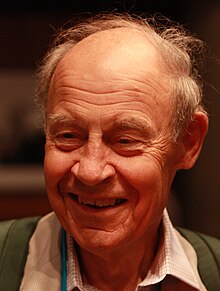Dudley R. Herschbach
Dudley Robert Herschbach (born June 18, 1932 in San José , California ) is an American chemist . Herschbach was awarded the Nobel Prize in Chemistry in 1986 together with Yuan T. Lee and John C. Polanyi for their work in the field of the dynamics of chemical processes .
Dudley Herschbach grew up in the countryside near San Jose and from 1950 studied chemistry (and mathematics with a bachelor's degree, among others with George Polya , Gabor Szegö ) at Stanford University , where he received his master's degree in chemistry with Harold Johnston in 1955 . In 1956 he received a master's degree in physics from Harvard University , where he received his doctorate in chemical physics ( Internal rotation and microwave spectroscopy ) under Edgar Bright Wilson in 1958 . The dissertation dealt with the restricted internal degrees of freedom of rotation of methyl groups in molecules and was both theoretical and experimental ( microwave spectroscopy ). 1957 to 1959 he was a junior fellow at Harvard and from 1959 a Sloan Research Fellow . He then went to the University of California, Berkeley , where he became an assistant professor in 1959 and an associate professor of chemistry in 1961. There he began his molecular beam experiments to investigate simple chemical reactions, continued as a professor at Harvard from 1963. The crossed beam experiments were refined in particular with Yuan Lee, who joined Herschbach's group as a post-doctoral student in 1967 , for example with techniques from experimental nuclear physics . In 1976 he became Frank B. Baird Jr. Professor of Science at Harvard. From 1964 to 1977 he was in charge of the chemical physics program and from 1977 to 1980 he was head of the chemistry faculty. 1981 to 1986 he was with his wife director (Master) of the Currier House at Harvard. Today (2010) he is Professor Emeritus there. Since 2005 he has also been a physics professor at Texas A&M University .
Herschbach was visiting professor at the University of Göttingen in 1963 and as a Guggenheim Fellow at the Albert Ludwig University of Freiburg in 1968 . In 1976 he was a Fairchild Scholar at Caltech . He was a consultant at Exxon (at their research laboratories and as an Exxon Faculty Fellow 1981), at Los Alamos National Laboratory (where he also carried out part of the work for his dissertation) and at Aerodyne. Since 1980 he has been co-editor of the Journal of Physical Chemistry. He was on the Council of the Center for Arms Control and Non-Proliferation .
Herschbach is a member of the National Academy of Sciences (1967), the American Academy of Arts and Sciences (1964) and the American Philosophical Society (1989). He received the ACS Award in Pure Chemistry (1965), the Linus Pauling Medal (1978), the Langmuir Prize (1983) and the Michael Polanyi Medal (1981). He is an honorary doctor of the University of Toronto (1977). Since 1988 he has been an "External Scientific Member" of the Max Planck Institute for Dynamics and Self-Organization (Göttingen).
From 1992 to 2010 he was chairman of the Society for Science and the Public in Washington DC
He has been married to the chemist Georgene Botyos since 1964 and has two daughters. Prior to her retirement in 2009, his wife was Chair of the Undergraduate Education Committee at Harvard.
In 2003, Herschbach appeared as a character in the episode Death Greetings from Springfield of the series The Simpsons . He spoke to himself in the original.
Fonts
- as an author
- Internal rotation and microwave spectroscopy . Dissertation, Harvard University 1958.
- Molecular collisions and chemical physics . World Scientific Press, Singapore 1998, ISBN 981-02-1797-8 .
- as editor
- Chemical Kinetics . Butterworths, London 1976, ISBN 0-408-70608-2 .
- Dimensional scaling in chemical physics . Kluwer Publ., Dordrecht 1993, ISBN 0-7923-2036-0 .
- In memoriam Otto Stern on the 100th anniversary of his birth . Springer International, Berlin 1988.
Web links
- Information from the Nobel Foundation on the 1986 award to Dudley R. Herschbach (English)
- Search for Dudley R. Herschbach in the SPK digital portal of the Prussian Cultural Heritage Foundation
- Video interview with Herschbach in the "Conversations with History" series (UC Berkeley)
Individual evidence
- ^ Member History: Dudley Robert Herschbach. American Philosophical Society, accessed September 28, 2018 (with biography).
- ^ Homepage of the MPI for Dynamics and Self-Organization, Organization, accessed September 29, 2017
- ↑ Handbook on the Institute History of the Max Planck Society, Volume 1, Berlin 2016, page 387 (PDF, 75 MB) The year 2004 has been given, since 1988 at the predecessor institute, the MPI for Flow Research
| personal data | |
|---|---|
| SURNAME | Herschbach, Dudley R. |
| ALTERNATIVE NAMES | Herschbach, Dudley Robert (full name) |
| BRIEF DESCRIPTION | American chemist and Nobel Prize winner in chemistry |
| DATE OF BIRTH | June 18, 1932 |
| PLACE OF BIRTH | San Jose , California |
